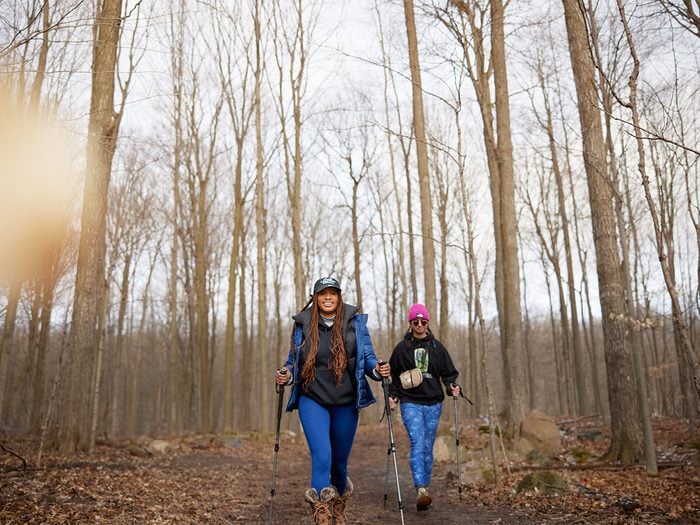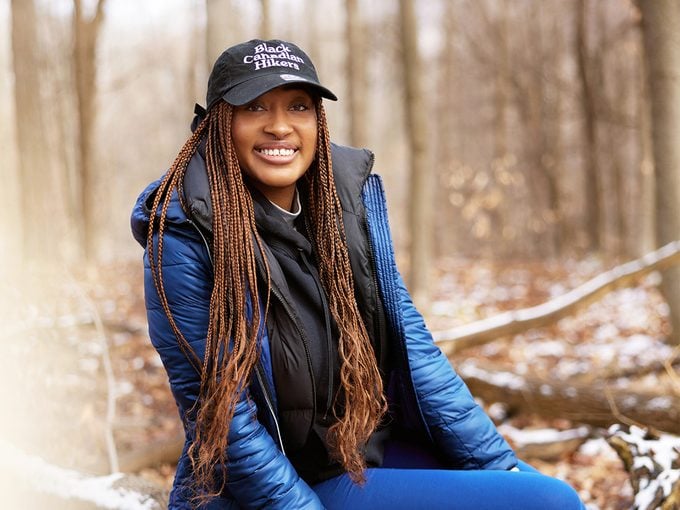Hiking Isn’t Just Good For Your Body — It’s Great For Your Mind, Too

Sure, a romp around the woods is great for your physical health. But the mental health benefits are also worth the trek.
“On the trails, I slow down and de-stress,” says Shyrai Sutherland, a personal support and hospice worker living in Waterloo, Ont. She gets mental clarity by going outdoors for a hike, and it’s an important part of her overall wellness routine. As someone who juggles school (recreation and leisure studies at the University of Waterloo) and work, Sutherland says that hiking helps keep her physically fit and emotionally balanced. Sutherland isn’t the only one finding an eco-antidote to the stresses of modern life. Many therapists are recommending their clients get some “green exercise”—that is, a workout in the outdoors. Canadian doctors are also writing prescriptions: The PaRx program encourages people of all ages to head outside more often for increased energy, improved mood and reduced pain, stress and anxiety. Participants receive a nature “prescription” file and access to special offers from partners like Parks Canada and regional organizations like the Canadian Museum of Nature in Ontario.
Going outside can decrease your levels of cortisol, which lowers stress levels, says Sarah Kennell, the national director of public policy at the Canadian Mental Health Association. Kennell points to studies done on forest bathing (the practice of relaxing in a natural environment) that have found all sorts of benefits. “It’s an old and well-studied concept of getting out in nature and being present, removing headsets and devices and notifications and really taking a step back from day-to-day stresses,” she says. One recent study found that forest bathing reduces anxiety, depression, anger, mental fatigue and confusion while increasing vigour, which might indicate that it can help prevent depression. And the more time you spend outdoors, the greater the benefits. Kennell says that even 10 minutes hiking in nature would have “a significant positive impact on mental well-being, and extending the amount of time to 20 or 30 minutes would be an efficient stress reducer.”
Even without exercise or movement, simply engaging with the great outdoors has benefits. One study in Science found that patients who looked out a window while recovering from gallbladder surgery had decreased recovery time and asked for less pain medication. Where the benefits really kick in, though, is when you combine nature with exercise. “Research shows that about six weeks of moderate-intensity aerobic activity led to a decrease in severity of symptoms related to depression, anxiety and psychological distress,” says Kennell. “And if that exercise was taking place in nature, it could further boosts mental health impacts.”
Hiking has also been shown to reduce the risk of heart disease (thanks to the cardio workout it provides), lower blood pressure, build strong muscles and bones, improve arthritis and improve sleep. Hiking in nature can also help improve your balance: Hills, roots, sticks, mud and rocks all create an uneven terrain that challenges you to be steady on your feet. These physical benefits mean reaping mental health benefits as well, says Kennell. “There are positive correlations between increased aerobic activity and decreased cortisol levels, the hormone associated with stress,” she explains.
The nice thing about hiking is that it doesn’t really feel like exercise. Link up with a friend, bring your dog, experience new sights, sounds and smells—even the very same trail will change with the seasons. And the best part? All you need to get started is a bit of green space. Even parks within urban centres work great.

Get to know: Shyrai Sutherland
“I love the tranquility of being outdoors,” says hospice worker Shyrai Sutherland, “and just tuning into what I can hear, what I can see, what I can feel.” Sutherland fell in love with hiking in 2015, when she lived for 10 months near the Rocky Mountains in Alberta. Upon her return to Toronto, she kept it up.
In 2020, when the Black Lives Matter movement sparked a racial reckoning—especially as Christian Cooper was threatened and reported for “birding while Black”—Sutherland knew she had to act. She had watched people suffer mentally, socially and financially while many parks and leisure centres closed during pandemic lockdowns. She wanted Black people in her community to be able to gather, heal and enjoy outdoor spaces without fear. So she started Black Canadian Hikers. It’s a group dedicated to getting “other people who look like me out on the trails, taking up space and enjoying hiking and nature,” says Sutherland.
In May 2020, the first eight participants laced up their boots and hit a trail through Mono Cliffs Provincial Park in southern Ontario. “It was just so empowering and liberating,” says Sutherland. “I loved hearing feedback on how beautiful this experience was for people. How it opened up their worlds.”
Black Canadian Hikers meets monthly for guided hikes within the Toronto area and Kitchener-Waterloo. Some hikes have special add-ons, like guided meditations, yoga or birding. One focused on healing in nature for men. But the ultimate goal is relaxation, says Sutherland. “People are there to unwind; so, I just try to make it a positive experience.” —Valerie Howes




